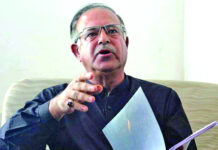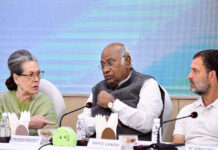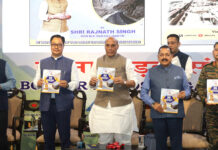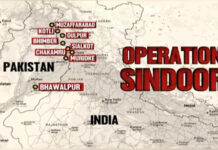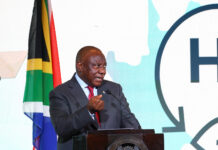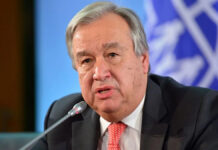Imran Khan, who rose to power by encouraging sit-ins, is now himself faced with an unprecedented protest, which is aimed at toppling his Government
Pakistan has a unique political phenomenon of staging sit-ins, a strategy that is routinely deployed to express political or religious protests and bring the sitting Government to its knees. Typically, protesters camp in the arterial intersections of the capital city, Islamabad, and openly dare the Government into succumbing to its demands. So far, successive Pakistani Governments have been unable to devise an effective counter-measure against the virtual seizure of the capital and, thus, the nation. All half-hearted and petulant measures like the deployment of additional security forces, barricading, barbed wires and shipping containers have practically remained ineffective against the imminent spectre of a civic clampdown, vandalism and torching of property. Forcible eviction of the protesters is usually not an option as they have a tendency to fuel fire and lend dangerous credence to the protest issues in an increasingly restive, angry and regime-wary Pakistan.
Therefore, any organisation, with even a basic modicum of public support and an inflammatory cause to boot, can cripple the sitting Government. Competing interests of various stakeholders in the Pakistani “establishment” have ensured that there is an invariable and unstated conflict of interest among the political classes, clergy, judiciary and above all, the Pakistani military. This results in intrigues, deceits and behind-the-scenes manoeuvers to outwit each other, which gives the protests a lot of unimagined and unacknowledged energy.
A few years ago, an unknown religious organisation, Tehreek-i-Labaik Ya Rasool Allah, had organised a powerful “sit-in” against an amendment to the oath of office for national and provincial Assemblies, wherein the semantics had changed from “I believe” to “I solemnly swear” regarding the affirmation of the Holy Prophet as the final Prophet. Though the Government attributed the unintended change to a clerical mistake, the emotions generated were powerful enough to evoke protests across the country and soon, the Law Minister was forced to resign. The then Opposition leader, Imran Khan, smelt political opportunity to sound holier-than-thou and sought the resignation of the Law Minister and the Prime Minister.
Even the Pakistani military played ball and resisted from taking action against “our own people” and, instead, embarrassed the sitting Government by offering its good offices to “mediate” at a time when the latter was hopelessly capitulating. The Government of the day came out of the episode looking meek and the protesting zealots (aided immeasurably by politicians like Imran Khan, the clergy and the Pakistani military) made sure that the religiously-concerned electorate are deliberately manipulated by the turn of events.
Crucially, stage management of the said protest by vested stakeholders also laid waste to any hope of changing the blasphemy laws, even though leaders like Imran Khan played the role of an “all-rounder” by endearing themselves to the middle class and the intelligentsia by posturing supposedly reformist agenda, while simultaneously winning over the hardliners by partaking such opportunistic dramas.
Much earlier, too, these stakeholders had tested the waters by organising the inquilab or azadi march that culminated in a familiar “sit-in” at Islamabad. That time, too, Imran Khan had teamed up with a cleric, Tahir-ul-Qadri, and sought to expose, embarrass and weaken the sitting Government — a project that had unmistakable fingerprints of the Pakistani military writ all over.
Today, time and tide have changed and the Pakistani political instinct for “sit-in” protests looms large over Imran Khan himself, who had gained immense political clout by engaging with extremist religious organisations during his Opposition days. Now it is the turn of yet another maulana-politician, Fazal-ur-Rehman, the president of the Jamiat Ulema-e-Islam (F), to threaten yet another azadi march on October 27.
Like Imran Khan himself, the maulana has had a history of selective flip-flops with various positions to nurture his political growth — incredulously even with the Americans, who are seen as an influential lobby within the narrative of Pakistani governance. WikiLeaks had released cables, stating that the then American Ambassador noted about the maulana, “He has made it clear that his still significant number of votes are up for sale” in a desperate bid to seek Washington’s blessings in the maulana’s hope to become the Prime Minister. The sham of the maulana’s anti-American and pro-Taliban rhetoric was exposed in the same manner as Imran Khan’s “Naya Pakistan” should be contextualised with the earning of the contradictory sobriquet of Taliban Khan.
Pakistani politics has a dynamic of its own that is neither consistent nor linear and is only circumstantial. The fear of the new azadi march is not in the amount of clout that the maulana carries by himself but more from the resultant force that can be generated with either the silent acquiescence or the active support of various elements of the Pakistani “establishment.”
Key players like the Pakistani military could also “tolerate” the maulana’s protestations to keep Imran Khan in check and remain vulnerable — power play in such events is an opportunity to flex institutional muscles and send messages to other stakeholders.
The expeditious war cry of “Islam is in danger” is something that can be easily invoked by the wily maulana to corner Imran Khan — it is an age-old tact that never wanes and something that Imran Khan himself was complicit of in the past.
This line could spin off into anti-American and pro-Taliban realms that run contrary to the international image of a reformist that Imran Khan is trying to cultivate. While other political parties are egging on the maulana to take on Imran Khan himself, they are stopping short of over committing themselves since they are not sure of the exact quantum of animus that the Imran Khan Government has generated within the palace intrigues between Islamabad and Rawalpindi.
In Pakistan, the position of the Opposition is clearer, pronounced and articulate since they can cry themselves hoarse over corruption, ineptitude, religion and the handling of India while taking on the Government. Imran Khan now faces the genie that he himself had unleashed earlier as yet another ambitious leader with a similarly duplicitous record in seeking to replicate a crippling “sit-in.”
(The writer, a military veteran, is a former Lt Governor of Andaman & Nicobar Islands and Puducherry)




